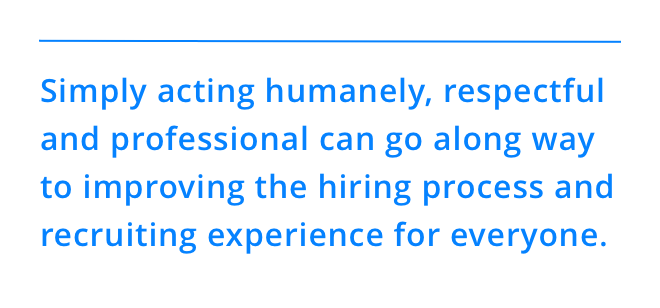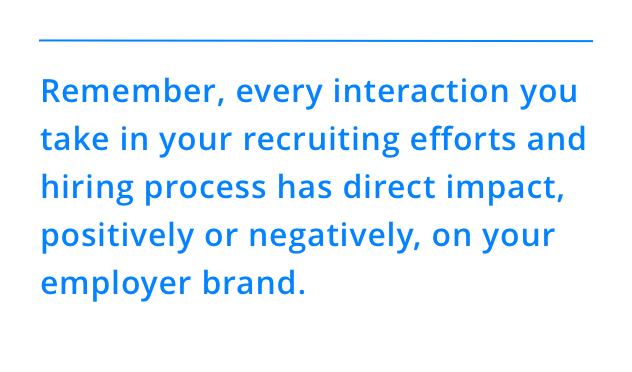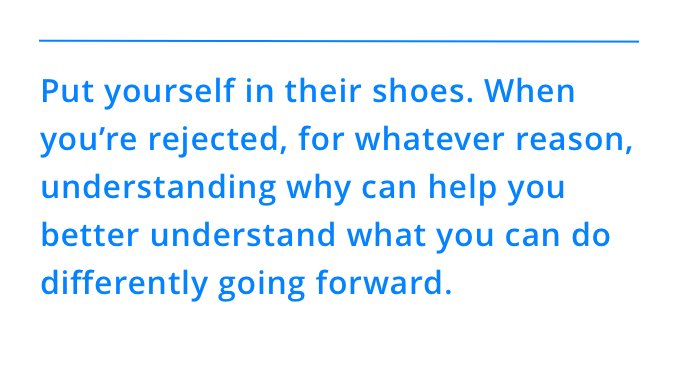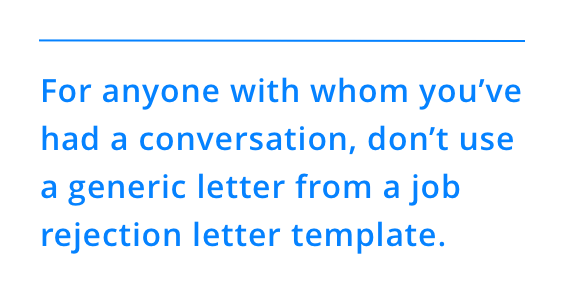There isn’t anyone who’s in job search mode who hasn’t reviewed a job posting, thinks there’s a great fit and applies for the open position. You have phone interviews, maybe meet in person and perhaps even come back for further rounds. And then you wait. And wait. And weeks (if not longer) later, a generic candidate rejection letter shows up in your inbox.
You’ve put lots of time and effort into the process, but with a curt, impersonal response, feel you haven’t been treated respectfully, and walk away with a negative view of the company.
Don’t be that company! There’s no reason to treat candidates interested in your organization as if you couldn’t be bothered, after they’ve engaged and spent time with you. Remember, every interaction you take in your recruiting efforts and hiring process has direct impact, positively or negatively, on your employer brand — whether or not you extend a job offer to that candidate. Providing a positive candidate experience is critical.
If you have an active recruiting program and Human Resource team and will be hiring in the future, the last thing you want to do is take actions that will sour the reputation of your company in the eyes of future job candidates. And responding impersonally to job applicants in the interview process is one of the most common ways to harm your employer brand.
The good thing is, that done properly, it can be one of the easiest ways to help build your employer brand. To show how, I want to share some best practices we’ve learned from working with all our customers with best-of-class recruiting programs, as well as our own experiences in building a fast growing startup in the recruiting software space.
Also interested in improving your candidate experience? Download our guide for the play-by-play.
What Job Candidates Want – and Should Expect
It’s not that complicated. Not everyone expects to be hired. The job search and interview process is often a number’s game, or one doesn’t get hired due to mismatched experience, or missing skills, or the always amorphous ‘fit.’ You know that. And the candidates know that. But when getting rejected by recruiters, candidates simply want to understand why the fit wasn’t there, especially after any amount of discussions, and want it even more, the longer the process is.
It’s a natural and not at all, an unrealistic expectation. Put yourself in their shoes. When you’re rejected, for whatever reason, understanding why can help you better understand what you can do differently going forward. Importantly, it can put your company in a good light and stand out from other companies out there.
Best Practices When Rejecting Candidates
Here are a number of elements to keep in mind when writing a candidate rejection letter to job candidates you turn down.
Most important, make sure you respond to every single applicant that applies to your position. For those you’ve never spoken to and don’t pass your initial screens, it’s ok for your recruiters to send a brief, non-personalized “no thank you” email. While it’s so easy (too easy?) to apply these days, it doesn’t take that much effort to ensure you respond to everyone that reaches out, particularly if you have an applicant tracking system that automates many of the recurring recruiting workflows and processes.
- For anyone with whom you’ve had a conversation (i.e., beyond an initial resume screen where you’ve had a first round phone screen), don’t use a generic letter from a job rejection letter template. This is one I feel very strongly about. If you’ve had more than a five minute conversation with someone, you should be able to specify briefly why the candidate hasn’t made it to the next round. By adding even one point referencing your conversation from the interview process, you’ll provide a basic rationale to your decision related to her own candidacy.
- Use a common structure for each rejection email so you don’t have to reinvent something from scratch each time:
- Thank the applicant for taking the time to speak with you (remember, she spent time preparing for your call, however brief or ‘standard’ it may be on your part).
- Be clear that she’s no longer being considered for the position so there’s no doubt or confusion.
- Be as specific as possible, referring to her background and experience, as to why you’re declining (“we’re looking for someone with more front end programming…or management and supervisory…or government selling experience”). Be clear about what your company needs are and where she didn’t meet those.
- Include a positive if you can that came up during the conversation (“your portfolio was quite impressive” or “you clearly have a strong grasp of social media marketing”).
- If you liked the candidate and could be interested in her for a different role in the future, ask if it’s ok to reach out when appropriate (avoid the “we’ll keep it on file” boilerplate which comes off as useless as best). Demonstrating such interest shows it really was a position-specific fit issue and keeps the goodwill existing towards the company – ideal for when you do have the right position for the candidate in the future.
- The deeper in the recruiting and hiring process someone goes, the more you “owe” them am actual specific rationale for your decision. Particularly, if someone’s had any amount of in person interviews, or even more so, have completed any type of assignment for you as part of the evaluation, there’s no excuse for not providing some level of personalization. The candidate took time to prepare, engage with you recruiters, travel to your office, possibly reschedule other commitments or obligations, etc. They’re receiving potentially bad news now; be respectful of her efforts and appreciative of her interests in your company.
Example of the Right Way to Write a Candidate Rejection Email
As we’ve emphasized here, we’re not fans of generic rejection email templates that come off as just that. You should have a standard structure as outlined above but it should be personalized to the candidate and the particular role. These letters should be sent by the recruiter or the hiring manager, depending on how far through the interview process the candidate went.
For example, here’s a rejection letter sample that is likely to garner a much better reception than the typical canned approach:
Dear Alex:
We all greatly appreciate the time and efforts you’ve made over the last weeks in pursuing our Sr. Marketing Manager position. However, after careful evaluation of the specific needs we have and skill set we see as most suited to succeed in the role, we have decided to move forward with another candidate.
The team and I thought you were particularly strong in developing compelling, well written content, such as the ebook and blog posts you shared, as well as on the demand gen side. But for this role, we want to have someone with deeper experience on the product marketing side, particularly with some technical exposure to our sector and target audience.
As I shared, we’re quite optimistic about our growth trajectory and should things proceed as planned, I’d expect continued growth in our marketing team, with new roles where your background could be a better fit for our needs. If it’s ok, and the timing’s right for you, I’d like to be able to reach out in the future should new, more applicable opportunities arise.
Thanks again for your interest.
A letter like this may take a bit more time and a little thought, but it’s well worth the effort!
Hiring Bill of Rights
At Comeet, we have our own set of policies, which I’ve coined our Hiring Bill of Rights. It’s what we’ve put into practice to supercharge our own recruiting practices and built around treating candidates well. While I’ll expand on what this is in the future, one particular practice I personally follow is to call anyone with whom I’ve spoken to about joining Comeet, particularly if it was in person. While I can’t do this for every single applicant, I do my best to make this personal outreach for most candidates.
It might be difficult to put a hard ROI on these calls but I know it helps build a positive impression of our company in the market. I have quite a number of candidates who’ve expressed their gratitude and appreciation for such a personal touch, as well as the surprise that a company executive would actually go the extra step to close the loop with them so personally and professionally.
Why is Writing a Personalized Rejection Letter Important?
Making your company more ‘human’ and respectful is never a bad practice to follow. But if you want to know “what’s in it for me?” here goes…
As I mentioned earlier, engaging with applicants on a more personalized manner is an ideal way to build, grow and protect your employer brand. Applicants treated well are much more likely to recommend their friends and contacts to your organization. I know a number of companies that have gotten highly qualified applicants referred by other candidates they had passed on. Treating those you’re rejecting well is one of the most important steps to lead to this.
And remember, that in many cases, the people you’re considering are in your target market for your company’s solutions. Treating them well and not turning then off is a great method to move from engaging them with your employer brand to engaging them with your corporate brand as a potential customer, or even a referrer or influencer down the line. You never know how your business may come across someone in the future. An applicant today could be a sales prospect tomorrow. Why wouldn’t you want to leave everyone with a positive impression of your company?

I don’t think we need to go to that extreme and all the regulations it might require. Simply acting humanely, respectful and professional can go along way to improving the hiring process and recruiting experience for everyone.
Are you looking to start your hiring process today? Comeet can help. Check out to our pricing plans learn more about how we can redefine the way you recruit new talent. Or just drop your details below and we'll get back to you promptly.




 Most important,
Most important, 


























